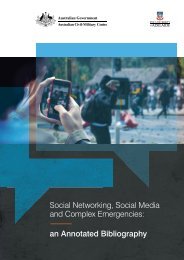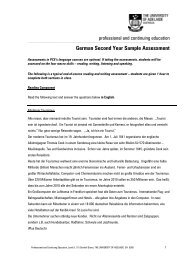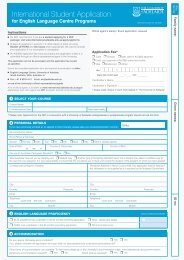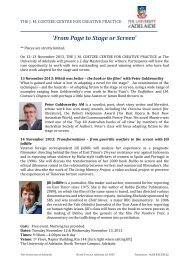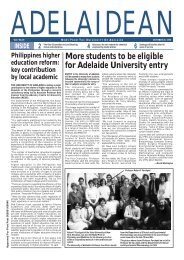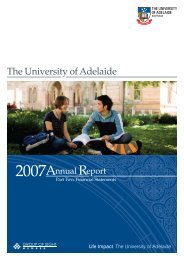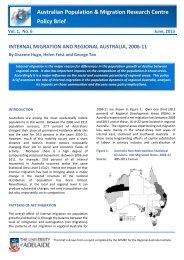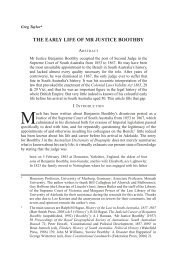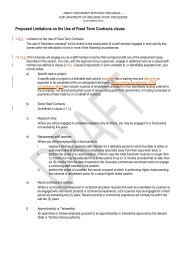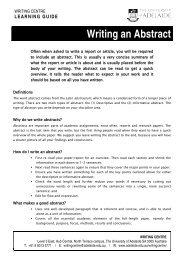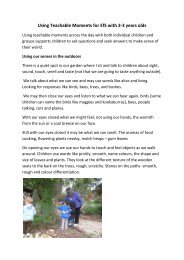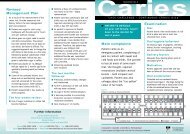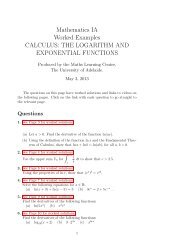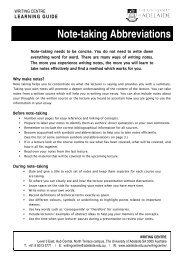Unbridling the Tongues of Women - The University of Adelaide
Unbridling the Tongues of Women - The University of Adelaide
Unbridling the Tongues of Women - The University of Adelaide
You also want an ePaper? Increase the reach of your titles
YUMPU automatically turns print PDFs into web optimized ePapers that Google loves.
<strong>Unbridling</strong> <strong>the</strong> tongues <strong>of</strong> women<br />
If Dorothy Paynter was right, <strong>the</strong>n <strong>the</strong> woman inhibited from voting had no need <strong>of</strong><br />
anyone’s advice about how to vote: <strong>the</strong>ir political understanding was already acute.<br />
However, <strong>the</strong>ir numbers were probably relatively small: F. W. Holder, treasurer in<br />
Kingston’s government, declared that <strong>the</strong> percentage <strong>of</strong> women who registered was<br />
‘very high’. Of those enrolled, <strong>the</strong> percentage who went to <strong>the</strong> polls in 1896 was<br />
marginally higher (66.44%) than <strong>the</strong> percentage <strong>of</strong> men who voted (66.33%). 77<br />
Spence continued to <strong>of</strong>fer educational opportunities for potential voters, delivering<br />
lectures on subjects as diverse as <strong>the</strong> anarchist Prince Kropotkin, finance in<br />
South Australia, and Susan B. Anthony. 78 Her conviction that women should learn<br />
to participate in public life, for <strong>the</strong>ir own benefit and for that <strong>of</strong> <strong>the</strong> whole society,<br />
never wavered. She urged acceptance <strong>of</strong> political responsibility upon <strong>the</strong> old scholars<br />
<strong>of</strong> ‘Ladies’ schools’ and nurses alike. 79 But she also complained that South Australian<br />
women were not voting ‘as women’, but as <strong>the</strong>ir husbands and fa<strong>the</strong>rs voted. 80 She<br />
saw <strong>the</strong> remedy for such dependence in organisation.<br />
At first she was content to support <strong>the</strong> bodies springing up in <strong>the</strong> wake <strong>of</strong> <strong>the</strong><br />
victory <strong>of</strong> 1894. In August 1895, she addressed <strong>the</strong> <strong>Women</strong>’s League, <strong>the</strong> body<br />
formed by members <strong>of</strong> <strong>the</strong> now defunct <strong>Women</strong>’s Suffrage League, on <strong>the</strong> need for<br />
solidarity among women, as women, ‘apart from all considerations <strong>of</strong> class and party’.<br />
81 However her acquaintance with <strong>the</strong> international women’s movement, and her<br />
growing friendship with feminists in o<strong>the</strong>r Australian colonies who looked to South<br />
Australia and to Spence as a ‘Pioneer Woman’ for support, led her to decide that <strong>the</strong><br />
multifarious activities <strong>of</strong> <strong>the</strong> local feminists would be streng<strong>the</strong>ned by affiliation with<br />
a central body, a national council <strong>of</strong> women. <strong>The</strong> International Council <strong>of</strong> <strong>Women</strong><br />
formed in London in 1888, through <strong>the</strong> national councils affiliated with it, provided<br />
a means <strong>of</strong> co-operating in specific enterprises for organisations that were not o<strong>the</strong>rwise<br />
connected. 82 Some South Australians had attempted to found a national council<br />
<strong>of</strong> women as early as 1889, but <strong>the</strong>y had failed. It was 1902 before a public meeting<br />
in <strong>Adelaide</strong> formed a council, with Spence as one <strong>of</strong> its vice-presidents, and that was<br />
after councils had been established in New South Wales, Victoria and Tasmania. 83<br />
Spence believed that <strong>the</strong> council would give South Australian women impetus for<br />
fur<strong>the</strong>r work, as well as organisation. 84 In 1905 she argued for federation <strong>of</strong> <strong>the</strong> state<br />
councils ‘for <strong>the</strong> purpose <strong>of</strong> interaction and combined action’. She urged, as well,<br />
inclusion <strong>of</strong> delegates from associations <strong>of</strong> teachers, university graduates and nurses,<br />
and for smaller subscriptions which would admit less financially comfortable women<br />
to membership. 85 Despite her efforts, <strong>the</strong> South Australian council <strong>of</strong> women faded<br />
158



